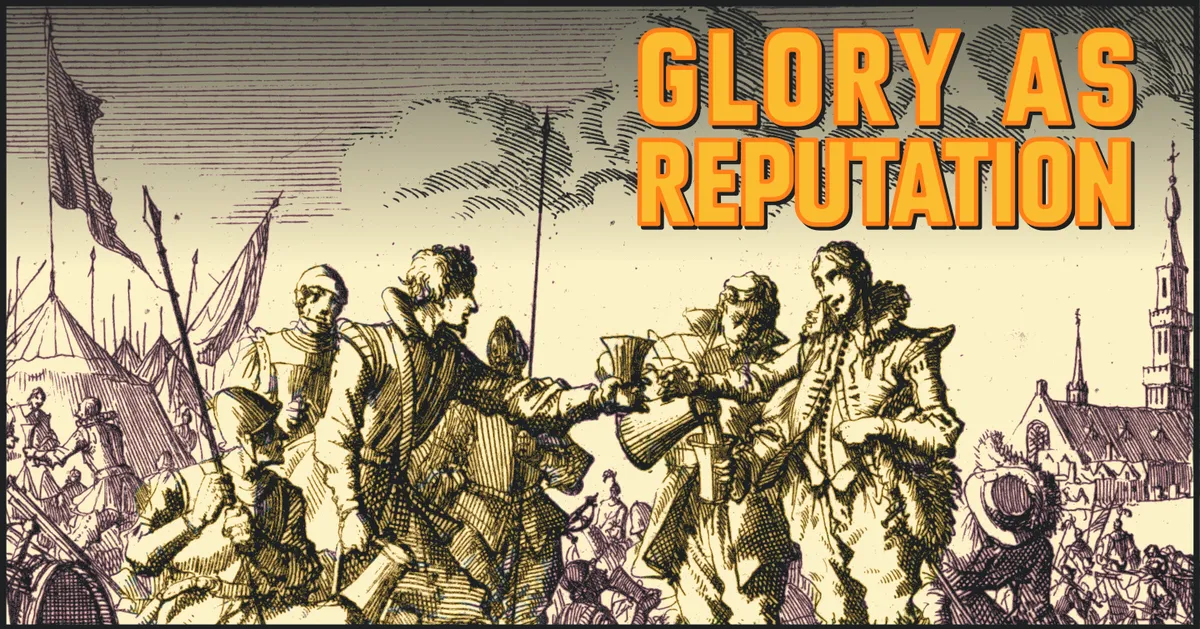Glory as Reputation

Playing Mythic Bastionland, Knights gain Glory as they resolve Myths and pull off other feats. When they meet someone for the first time, there's a chance their reputation gets there first.
At the table I wanted a simple procedure I could run in the moment: has this specific person actually heard of you or your accomplishments?
I stole the mechanic from Sam Seer's dead-simple Mothership Reputation hack, which turns a character's High Score into a reputation roll. I just swapped in Glory.
The Reputation Roll
When a Knight meets someone for the first time, roll 1d12.
- If the result is less than or equal to your Glory, they've heard of you (by name, title, or rumor).
- If the result is higher than your Glory, they haven't.
Only roll the first time you meet that specific NPC. After that, they either know you now or they don't.
Modifiers by Role and Distance
The book says most people fall into one of four roles: Vassal, Vagabond, Knight, or Seer, with messy layers of rank between them. Not everybody has the same access to rumors (or cares).
Feel free to use these tweaks when you make the check:
- Seers
Don't roll.
Seers are plugged into prophecy, omens, and visions. Assume that they have heard of the Knight in some form. - High-ranking Knights and Vassals
Roll with advantage: 2d12 and take the lower result.
This covers rulers, council members, rival Knights, stewards, and similar figures who are tuned into politics and talk. - Common Vassals, Vagabonds, and roaming hedge Knights
Roll normally.
These are locals in or near the same Holding, travelers who trade news, and mercenaries on the road. - People from far-off Holdings or other Realms
Roll with disadvantage: 2d12 and take the higher result.
Optional: If they are from an entirely different Realm, halve your Glory (rounded down) for this check first.
This is a guideline. If you're literally the ruler of the Seat of Power, most people in your domain will absolutely have heard of you. You don't need to roll for your own subjects unless it makes sense for the moment.
Using the Results
Okay, someone has heard of you. So what?
I treat a "yes, they've heard of you" result as immediate social texture. Their reaction tells you how the Knight's deeds are echoing through the world. You can reflect that right away in the situation.
People who have heard of the Knight might:
- Grant access that wouldn't normally be given (private audience, restricted area, guarded information).
- Offer resources without negotiation (lodging, supplies, troops, leverage at court).
- Attach expectations (a formal request for aid, naming the Knight as a protector, pressure to solve local problems).
Enemies who have heard of the Knight might:
- Avoid direct confrontation and switch to sabotage, ambush, or traps.
- Rally allies or reinforcements first, treating the Knight as a serious target instead of a random nuisance.
- Change objectives and instead of trying to kill the Knight outright, try to capture and ransom them.
The point of the roll is to feed the state of the world back to the players. Their actions start shaping access, resistance, and expectations. It's an easy way to generate consequences and put upward pressure on the fiction without much bookkeeping, and it helps the Realm feel reactive and alive.
Does this replace Reaction Rolls?
No. They work great together.
A Reputation Roll answers: "Have they heard of you?" A Reaction Roll answers: "How do they feel about you right now?"
The farmer might have heard of you but think the stories are exaggerated. Or they've absolutely heard of you and now expect you to fix their problems for free. Use a roll any time something is uncertain. They don't replace each other; they complement each other.
Making It Your Own
This mechanic is simple enough that you can lift it for other games.
In Mothership, for example, the High Score is just a number that keeps increasing the longer your character survives. Glory in Mythic Bastionland is tied to notable deeds. In another system you can just pick an equivalent stat, or make a new one that tracks the party's accomplishments.
You can also change which die you roll for Reputation:
- In a long campaign with a wide map, a bigger die (like a d20, or even d100) makes fame more granular and slower to spread.
- In a short campaign with a tight scope, a smaller die (like a d4) means people in the region are much more likely to have heard of you quickly.
- You can also scale by distance: roll a small die in your home region, a bigger die in neighboring regions, and an even bigger one in distant lands.
Personally, I like to keep tracking to a minimum. But feel free to play with die size, distance, and what "Glory" means in your game.